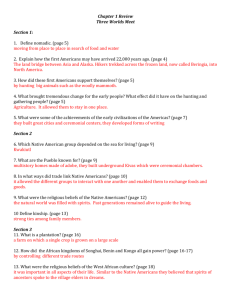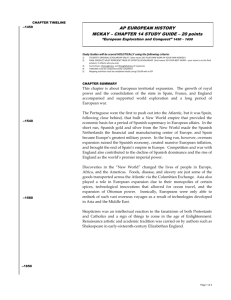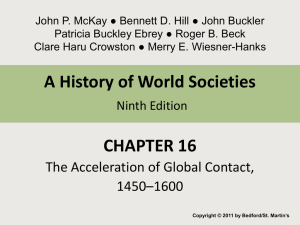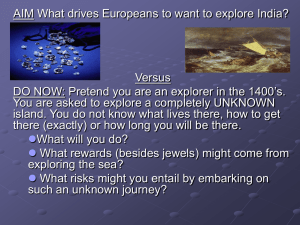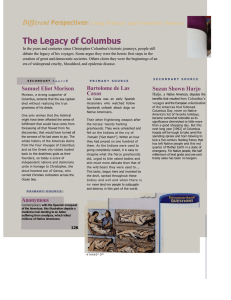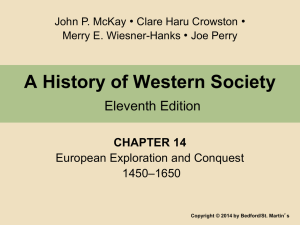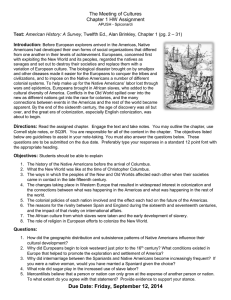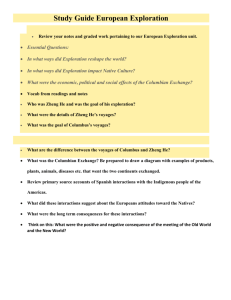European Voyages of Discovery
advertisement
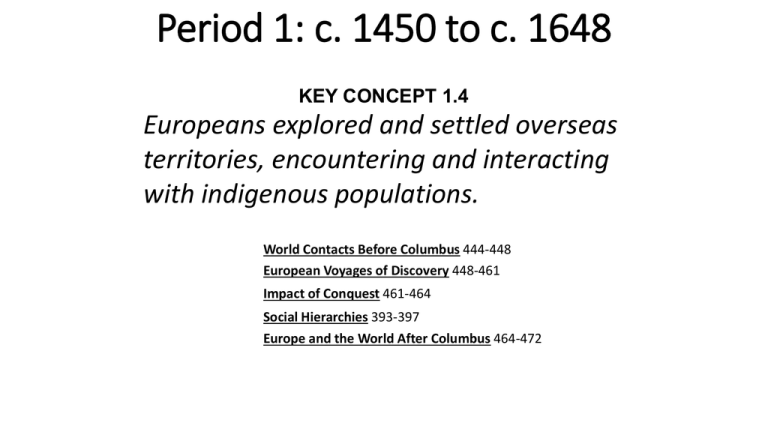
Period 1: c. 1450 to c. 1648 KEY CONCEPT 1.4 Europeans explored and settled overseas territories, encountering and interacting with indigenous populations. World Contacts Before Columbus 444-448 European Voyages of Discovery 448-461 Impact of Conquest 461-464 Social Hierarchies 393-397 Europe and the World After Columbus 464-472 KEY CONCEPT 1.4 From the 15th through the 17th centuries, Europeans used their mastery of the seas to extend their power in Africa, Asia, and the Americas. In the 15th century, the Portuguese sought direct access by sea to the sources of African gold, ivory, and slaves. At the same time, the rise of Ottoman power in the eastern Mediterranean led to Ottoman control of the Mediterranean trade routes and increased the motivation of Iberians and then northern Europeans to explore possible sea routes to the East. The success and consequences of these explorations, and the maritime expansion that followed them, rested on European adaptation of Muslim and Chinese navigational technology as well as advances in military technology and cartography. Political, economic, and religious rivalries among Europeans also stimulated maritime expansion. By the 17th century, Europeans had forged a global trade network that gradually edged out earlier Muslim and Chinese dominion in the Indian Ocean and the western Pacific. In Europe, these successes shifted economic power within Europe from the Mediterranean to the Atlantic states. In Asia, the Portuguese, Spanish, and Dutch competed for control of trade routes and trading stations. In the Americas, the Spanish and Portuguese led in the establishment of colonies, followed by the Dutch, French, and English. The pursuit of colonies was sustained by mercantilist economic theory, which promoted government management of economic imperatives and policies. The creation of maritime empires was also animated by the religious fervor sweeping Europe during the period of the Reformations (Catholic and Protestant). Global European expansion led to the conversion of indigenous populations in South and Central America, to an exchange of commodities and crops that enriched European and other civilizations that became part of the global trading network, and, eventually, to migrations that had profound effects on Europe. The expansion also challenged parochial worldviews in Christian Europe. Yet the Columbian Exchange also unleashed several ecological disasters — notably the death of vast numbers of the Americas’ population in epidemics of European diseases, such as smallpox and measles, against which the native populations had no defenses. The establishment of the plantation system in the American colonies also led to the vast expansion of the African slave trade, one feature of the new Atlantic trading system. World Contacts Before Columbus 444-448 I. European nations were driven by commercial and religious motives to explore overseas territories and establish colonies. [INT-1 | INT-2 | INT-6 | INT-11 | SP-5 | IS-10] World Contacts Before Columbus 444-448 1.4. I INT-1 Assess the relative influence of commercial and religious motives in promoting exploration and colonization. World Contacts Before Columbus 444-448 How did the Venetians and Genoese develop their trading systems? European Voyages of Discovery 448-461 1.4. I INT-6 Assess the role of the access to gold, spices, and luxury goods in encouraging the development of new economic theories and state policies such as mercantilism. 1.4. I INT-11 Explain how European motives and mercantilism brought non-European societies into global economic, diplomatic, military, and cultural networks. 1.4. I SP-5 Assess the role of colonization and mercantilism in altering the government’s relationship to the economy. 1.4. I INT-2 Analyze how Christianity justified European conquest of overseas territories and how they changed over time. European Voyages of Discovery 448-461 1.4. II INT-4 Explain how technological advances — resulting in more effective navigational, cartographic, and military technology — facilitated European interaction with other parts of the world. 1.4. II INT-3 Analyze how technological advances allowed European states to establish and administer overseas commercial and territorial empires. 1.4. II OS-6 Explain how European exploration and colonization was facilitated by advances in navigation, cartography, and military technology. 1.4. II SP-13 Evaluate how the emergence of new weapons changed the scale of exploration and colonization and shifted the balance of power. 1.4. II IS-3 Evaluate the role of transportation technology during exploration and colonization in forming and transforming society. European Voyages of Discovery 448-461 1.4. III INT-3 Analyze how European states established and administered overseas commercial and territorial empires through commercial networks. 1.4. III INT-6 Assess the role of overseas trade in encouraging the development of new commercial and trading networks. 1.4. III INT-11 Explain how the establishment of European empires brought non-European societies into global economic, diplomatic, military, and cultural networks. 1.4. III SP-15 Assess the impact of colonial empires on European diplomacy and balance of power until 1789. 1.4. III INT-1 Assess the relative influence of competition for trade in promoting exploration and colonization. European Voyages of Discovery 448-461 Ottoman conquest of Constantinople A. European states sought direct access to gold and spices and luxury goods as a means to enhance personal wealth and state power. European Voyages of Discovery 448-461 B. The rise of mercantilism gave the state a new role in promoting commercial development and the acquisition of colonies overseas. European Voyages of Discovery 448-461 C. Christianity served as a stimulus for exploration as governments and religious authorities sought to spread the faith and counter Islam, and as a justification for the physical and cultural subjugation of indigenous civilizations. European Voyages of Discovery 448-461 II. Advances in navigation, cartography, and military technology allowed Europeans to establish overseas colonies and empires. [INT-3 | INT-4 | OS-6 | SP-13 | IS-3] w Portolani European Voyages of Discovery 448-461 w w w Compass Lateen rig Stern-post rudder w Quadrant and astrolabe European Voyages of Discovery 448-461 w w Guns and gunpowder Horses European Voyages of Discovery 448-461 III. Europeans established overseas empires and trade networks through coercion and negotiation. [INT-1 | INT-3 | INT-6 | INT-11 | SP-15] European Voyages of Discovery 448-461 A. The Portuguese established a commercial network along the African coast, in South and East Asia, and in South America. Henry the Navigator European Voyages of Discovery 448-461 B. The Spanish established colonies across the Americas, the Caribbean, and the Pacific, which made Spain a dominant state in Europe. Christopher Columbus European Voyages of Discovery 448-461 Hernando Cortes Francisco Pizarro European Voyages of Discovery 448-461 C. The competition for trade led to conflicts and rivalries among European powers. Treaty of Tordesillas European Voyages of Discovery 448-461 D. The Atlantic nations of France, England, and the Netherlands followed by establishing their own colonies and trading networks to compete with Portuguese and Spanish dominance. European Voyages of Discovery 448-461 Dutch East India Company Impact of Conquest 461-464 IV. Europe’s colonial expansion led to a global exchange of goods, flora, fauna, cultural practices, and diseases, resulting in the destruction of some indigenous civilizations, a shift toward European dominance, and the expansion of the slave trade. [INT-5 | INT-6 | INT-7 | INT-9 | INT-11 | PP-1 | IS-7] Impact of Conquest 461-464 1.4. I IS-10 Analyze how and why Europeans have marginalized certain populations (defined as “other”) over the course of colonial conquest. 1.4. IV INT-5 Evaluate the impact of the Columbian Exchange — the global exchange of goods, plants, animals, and microbes — on Europe’s economy, society, and culture and the shift of economic power to Atlantic states. 1.4. IV INT-6 Assess the role of the Columbian Exchange in making Europe part of a global economic network. Impact of Conquest 461-464 Bartolome de Las Casas B. The exchange of new plants, animals, and diseases — the Columbian Exchange — created economic opportunities for Europeans and facilitated European subjugation and destruction of indigenous peoples, particularly in the Americas. Impact of Conquest 461-464 Impact of Conquest 461-464 From Europe to the Americas: w Wheat w Cattle w Horses w Pigs w Sheep w Smallpox w Measles From the Americas to Europe: w Tomatoes w Potatoes w Squash w Corn w Tobacco w Turkeys w Syphilis Social Hierarchies 393-397 1.4. IV IS-7 Evaluate how identities such as ethnicity and race have defined the individual in relationship to society, and how the slave trade affected this. Social Hierarchies 393-397 C. Slavery became more racial during the Renaissance. Europe and the World After Columbus 464-472 1.4. IV INT-7 Analyze how contact with non-European peoples affected attitudes toward race and the expansion of slave trade. 1.4. IV INT-11 Explain how European expansion and colonization brought non-European societies into the slave trade. 1.4. IV INT-9 Assess the role of European contact on overseas territories during the Columbian Exchange through the introduction of disease, participation in the slave trade and new consumer goods. 1.4. IV PP-1 Explain how and why the rise of mercantilism created a market and then a consumer economy. Europe and the World After Columbus 464-472 A. Europeans expanded the African slave trade in response to the establishment of a plantation economy in the Americas and demographic catastrophes among indigenous peoples. Europe and the World After Columbus 464-472 Europe and the World After Columbus 464-472 Europe and the World After Columbus 464-472 Montaigne Europe and the World After Columbus 464-472 Shakespeare Europe and the World After Columbus 464-472 A. The exchange of goods shifted the center of economic power in Europe from the Mediterranean to the Atlantic states and brought the latter into an expanding world economy.
